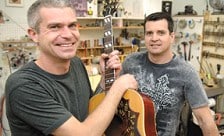The Lutherie Shop is experiencing a boom in requests for guitar repairs

Scott Rohden and Tim Thelen took up the guitar as teenagers more than 20 years ago. Thelen prefers playing in the comfort of his living room. Rohden doesn’t mind taking to the stage, when he has the time.
These days, there’s little time. Much of their music is found in the cacophony of belt sanders, drills, routers and diamond-tipped files scraping stainless and nickel steel guitar frets, all mixed with a power chord thumping through a Fender amplifier or the soft melody of an Irish ballad picked on an acoustic guitar.
Those are the sounds of guitars under or out of repair at The Lutherie Shop, which Rohden and Thelen opened in 2004 near Drake University in a building that has served as a warehouse and a church.
In those seven years, The Lutherie Shop has carved a business in the Midwest, doing repairs for retail guitar shops and their customers as well as Central Iowa musicians.
It is a business that has survived the Great Recession with gusto. On any given day, Rohden and Thelen are all motion, answering a constantly ringing telephone, searching for a completed repair among the 100 or so guitars in the shop at any given time, demonstrating technique that stresses or coddles the instrument.
“I really don’t want to get into your style of playing,” Thelen told one customer who brought in an acoustic guitar for setup – adjusting the distance of strings off the fingerboard for optimum sound and playability. He then went on to demonstrate on an air guitar two styles of picking, one that might be considered good for the health of the instrument, the other detrimental.
During the demonstration, Ed Harp of Algona played an Irish ballad. You can listen to Harp’s music at www.soundcloud.com/gibbyguy.
The previous day, Rohden diagnosed a dead-string issue with an electric guitar as a matter of a loose screw. He made the adjustment and told the customer that he would still get some unwanted buzz from the strings because the neck of the guitar had a bow in it. The young customer replied that he played with so much distortion that no one would notice the sound of a rattling string.
Rohden turned to fixing guitars after taking a Fender Stratocaster to a Dallas shop for repair. He wasn’t satisfied with the results.
“I was expecting more. Maybe I expected it to play itself,” he said. “I always had an aptitude for using my hands, so I started replacing pickups.” He kept making changes until the guitar played to his satisfaction. He also kept on tearing apart and rebuilding his own guitars, then did repair work for retail guitar shops.
He also discovered the late Dave Plummer, an almost legendary Greater Des Moines guitar builder or luthier who had been building guitars since the 1950s.
In 1995, Plummer wanted someone to take on his repair business so he could focus on building guitars. He took on Rohden for a two-year apprenticeship.
“The first thing he did was hand me a jigsaw and tell me to cut the (damaged) top off a Martin D-28 (a pricey and prestigious acoustic guitar). I thought he was kidding. I distinctly remember cutting the top off,” Rohden said.
He would work all day selling and repairing guitars (he doesn’t like sales) at a local shop, then he would work until 2 a.m. for Plummer. Eventually, he bought the repair side of Plummer’s business and went out on his own, repairing guitars in his garage.
Thelen’s introduction to guitar repair came as a teenager when he would buy “pawn shop beauties” and work on them. He also dabbled with the reconstruction of violins. In 1998, he graduated from a fretted instrument repair and construction program in Red Wing, Minn., and worked at shops in New England and the Midwest.
He returned to Greater Des Moines at Plummer’s request. He worked for Plummer, did some work for Rohden and had a full-time job at The Woodsmith Store in Clive.
“It was always financially tough at Plummer’s shop,” Thelen said.
The partnership with Rohden isn’t making either man rich, but it has been financially stable.
After a lull at the start of the Great Recession in 2008, business has boomed, with growth averaging about 7 percent a year.
The partners prefer to have a backlog of about 60 repair jobs at any given time, but in recent months that has grown to 100 or more, with some work, such as resetting a neck and replacing frets and a bridge, on a three-week backlog.
The Lutherie Shop does not advertise. Its business is built by word of mouth, and the word has spread to shops in Chicago, Minneapolis and Kansas City, to name a few Midwestern cities where guitar stores send instruments to Des Moines for repair.
Rohden and Thelen focus on guitars, mandolins and dobros. They rebuild and refinish. After Thelen took a class on applying a special finish used on Taylor guitars, The Lutherie Shop became one of a handful of businesses authorized by the Texas company to do such work.
The work ranges from repairs on vintage, high-value instruments to less expensive instruments that customers want upgraded.
Rohden and Thelen will replace strings, tighten a screw or cut the top off a rare acoustic.
“There’s virtually nothing we can’t do to a guitar,” Thelen said.










